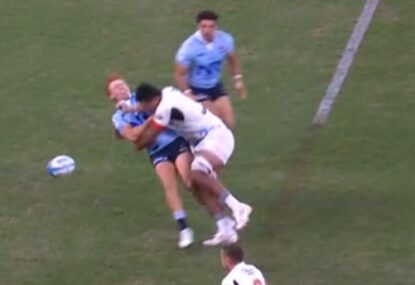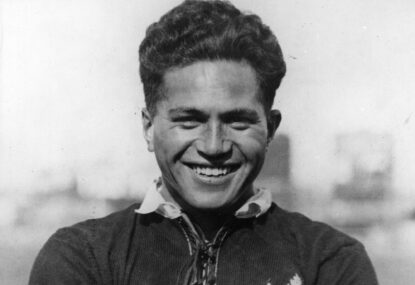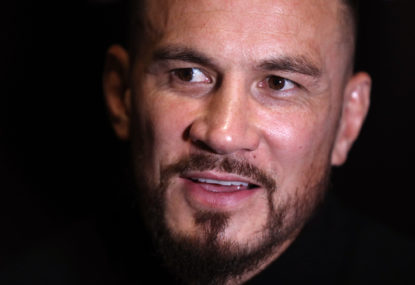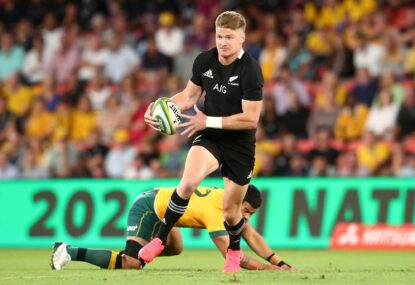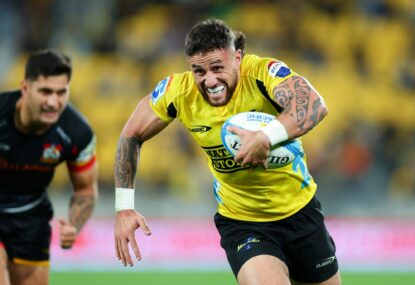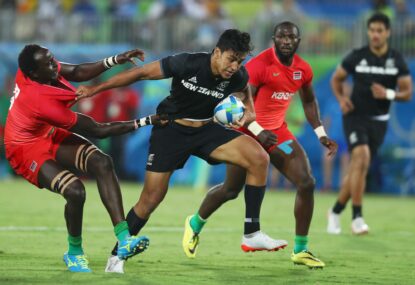The All Blacks staged one of their more memorable turnarounds in recent times with a 39-10 drubbing of the Wallabies at Eden Park on Saturday night, and in doing so showed themselves to be a unit with real fortitude.
Buried under a landslide of their own errors in Sydney the previous weekend, they endured a long week of quite strident criticism. Not all of it had been reserved for Sione Lauaki, but it came as no surprise when the All Blacks performed better without the out-of-form and too-bulky number eight. Lauaki was deservedly back playing Air New Zealand Cup rugby with Waikato, although ineffectually (more on that later).
Returning to his usual position at the back of the scrum and relieved of the captaincy duties which sat so uncomfortably with him, Rodney So’oialo typified the All Blacks desire to impose themselves on the game with far greater urgency. Jerome Kaino was given sole charge of the blindside flank, and the great Richie McCaw was back in the openside role. It wasn’t just the return of McCaw that changed things. His contribution was huge, admittedly, but the loose forward mix was balanced by having specialists in all positions.
McCaw was at pains to point out after the game that the loose forwards’ job was made easier this week because the tight five they operated around were functioning smoothly. Amidst all the high-scoreline euphoria, the captain’s praise was as insightful as it was modest. The tight forwards were the real stars on the night.
How many All Black lineouts have you seen over the last decade where ball was lost or at least too untidy to use effectively? How many teams had begun to expect poor lineout drills from New Zealand and been able to plan accordingly, as if they already owned the touchlines? How many times were you left wondering why our forwards didn’t even bother to contest opposition throws, and why in failing to do so we’d so obviously only helped the opposition’s rhythm and further built their confidence?
For me the condition was advanced. With my teeth sore from grinding I would wake dripping with sweat, my last fitful recollection being Anton Oliver hurling steak pies at a brick wall while I screamed WHY DOWN THE BACK??? in his deaf ear.
During this test, as I watched black jumpers destroy the Wallaby pattern throw after throw, I actually became light-headed from the strong dose of medicine I had done without for so long. Kaino was a revelation with his ability to shrink the Australian targets, and in the completion of his core set-piece tasks Ali Williams was so destructive that I forgave him his frequent lapses of handling and judgement in the later phases.
Williams’ absence from the breakdown aside, the All Blacks tight five were virtually flawless in their execution. They served up a steady stream of attacking ball from lineouts and scrums, and hunted like a pack at the breakdown.
Enjoying their sudden wealth of quality ball, Jimmy Cowan and Dan Carter played a clever territorial game and kicked the Wallabies out of the match. Maintenance of pressure brought about many Australian errors, and the All Blacks capitalised.
Prop Tony Woodcock and second five Ma’a Nonu scored two tries each, giving New Zealand a valuable bonus point. Nonu’s second on the stroke of full-time was awarded by the TMO when it could well have been denied, and the try was perhaps undeserved anyway because the Hurricanes midfielder had all but butchered it by ignoring his support, but the scoreline was already so emphatic and it had been so long since the All Blacks had received a lenient ruling that I counted the bonus point as a well-earned one.
In previous weeks it had seemed as if the All Black forwards were headless chickens at times, out of position and infringing far too frequently at the tackle, missing from defensive positions around the fringes and far too easily isolated when carrying the football.
At Eden Park they were almost telepathic in their understanding, and genuinely fierce rather than over-drilled or merely methodical… suddenly they seemed more like stormtroopers, zealots to a righteous cause.
The hunger was back, in other words. They were more than simply stung by the week’s worth of criticism. They looked as if they had accepted it as wholly deserved, and understood exactly what the missing ingredient was… unity.
Starting with Kapa o Pango was a good sign. A truly spine-tingling challenge signalled that they now deemed the Wallabies worthy of a respect they had not granted them in Sydney, but also signalled that they were about to demand some of their own. Tu iho nei!
In Sydney they had tried too often to run ball out of their own half instead of kicking to keep the ball in front of their pack.
Disrespectful.
They had fanned out across the field, forwards and backs alike, the forwards ready to run with ball that hadn’t been won yet at the last ruck or maul they were absent from. Neither were they marking up on the blind or in guard positions when ball was turned over at these very breakdowns.
Disrespectful.
In the face of such arrogance and neglect, at Homebush the Wallabies had needed to do little more than feed off the All Blacks’ frequent errors. At Eden Park there weren’t any of real significance.
This used to be a hallmark of All Black rugby, the core tasks being completed ruthlessly so that an edge in fitness and athletic ability could be exploited. Giving opposition the proper respect was always the clear message. There were no short cuts to victory at test level, challenges up front must be met before they could be bettered.
Occasionally an opposition team would rise to meet such high standards, and great tests would result.
But recently as a tendency to sometimes abdicate those responsibilities has crept into our game, in other nations’ eyes we had begun to seem as if we regarded ourselves as automatically better than everyone else… Special in some way (other than the Olympics at which we win our only gold medals anymore).
Well, we’re not special. Even when the All Blacks execute a game plan flawlessly, and end up putting great performances like this one on the park, all they are doing is fulfilling an obligation to give their best.
In this era, that’s just called being professionals.
In round one of the Air New Zealand Cup there were three freakish upsets. Firstly, Waikato were tipped over 10-18 by Northland in Whangarei on Thursday night. Not even the late introduction of demoted All Black Sione Lauaki could save them from the tenacity of the Northland effort (it may have, if Lauaki hadn’t seemed almost as out of his depth at provincial level as he had the week before at test level).
The Northland win on Thursday was surprising enough, but the shock was exceeded by Manawatu toppling Canterbury 25-24 in Christchurch on Saturday. Turning every Canterbury error into an instant territorial gain, the Green Machine kept hammering away and the nerve of the young Cantabrians failed. After an intercept by first five Matty James in the first half, two late tries by Manawatu wing Andre Taylor were enough for a famous late victory. Canterbury were left looking quizzically at the officials when a good-looking late penalty attempt was waved wide, but no replay was available to fan the flames of controversy.
Then on Sunday Counties-Manukau provided the weekend’s icing on the cake, a 17-6 win over Auckland in Pukekohe. Every Auckland handling error was cheered raucously by the locals, and each time as the visitors found themselves back-pedalling with fired-up Steelers breathing down their necks, the volume only increased. By full-time, with late tries making the win not only certain but a little embarrassing, it was deafening.
Tasman 7-8 Bay of Plenty
Northland 18-10 Waikato
Taranaki 20-13 North Harbour
Wellington 30-6 Hawke’s Bay
Canterbury 24-25 Manawatu
Southland 23-25 Otago
Counties-Manukau 17-6 Auckland






























































































